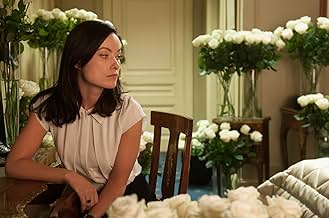CALIFICACIÓN DE IMDb
6.3/10
30 k
TU CALIFICACIÓN
Tres historias de amor entrelazadas entre tres parejas de tres ciudades: Roma, París y Nueva York.Tres historias de amor entrelazadas entre tres parejas de tres ciudades: Roma, París y Nueva York.Tres historias de amor entrelazadas entre tres parejas de tres ciudades: Roma, París y Nueva York.
- Dirección
- Guionista
- Elenco
- Premios
- 1 premio ganado y 1 nominación en total
- Dirección
- Guionista
- Todo el elenco y el equipo
- Producción, taquilla y más en IMDbPro
Opiniones destacadas
10kosmasp
Paul Haggis did it again. At least for me he did. Obviously judging by the low rating, it hasn't had the same effect on others here. I really loved the movie, the intricacies, the connections and of course the "resolution". There might be a better word for the ending, but one thing is for sure: The movie demands more than one viewing. You can watch it with different eyes (your own, just a matter of speaking) and see things in a new light.
There's also trademark Haggis dialog, pointing in one direction, making fun of it, by almost straying away, than going full throttle on the first assumption you made. You may or may not like that, but it's what Haggis can do very good. And he has the actors to pull anything off, he gives them. It's a great movie with little hints here and there, that make sense in the end. Even if you don't get everything the first time around, it is a rewarding (viewing) experience
There's also trademark Haggis dialog, pointing in one direction, making fun of it, by almost straying away, than going full throttle on the first assumption you made. You may or may not like that, but it's what Haggis can do very good. And he has the actors to pull anything off, he gives them. It's a great movie with little hints here and there, that make sense in the end. Even if you don't get everything the first time around, it is a rewarding (viewing) experience
Paul Haggis is best known as the director of the movie "Crash", which was the controversial winner of the Oscar for Best Picture in 2006 over its closest rival "Brokeback Mountain." Haggis is also the first screenwriter to win Oscars for Writing for two consecutive years, "Million Dollar Baby" in 2005 and "Crash" in 2006. It was the name of Paul Haggis that drew me to check out "Third Person" without knowing anything else about it.
Like "Crash", "Third Person" is also a film with multiple story lines. I have liked movies like this since I have seen "Amores Perros" and "21 Grams." I have admired how the scriptwriter managed to clearly tell three or four stories and then connect them to each other with an overarching bigger story.
Michael (Liam Neeson) is an aging Pulitzer-prize winning author who left his wife Elaine (Kim Basinger) and is now having an affair with a much younger Anna (Olivia Wilde) in Paris. Scott (Adrien Brody) is an unscrupulous clothing businessman who gets entangled with the shady financial problems of a gypsy-like local lady Monika (Moran Atias) in Rome. Julia (Mila Kunis) is a poor divorcée who lost custody of her young son to her estranged husband Rick (James Franco) because of an unfortunate accident with a plastic laundry bag.
It was good to see Liam Neeson again in a straight drama, not in another action vehicle that he is wont to do lately. Olivia Wilde is daring, gorgeous and smart, the perfect femme fatale. Mila Kunis stands out in a very serious dramatic role. Her brutally-emotional confrontation scene with James Franco was amazingly acted out. In terms of romantic chemistry though, the best was between Adrien Brody and Moran Atias. Their story line was interesting on its own, but seemed furthest off from any connection with the other two stories.
The underlying issue and conflict in all three stories was about trust. Anna's bizarre behavior is driving Michael nuts about her loyalty. On the other hand, Michael is using their stormy relationship as the subject of his book seemingly without Anna's consent. Monika's connection with a sleazy extortionist has Scott doubting her innocence. Rick cannot trust Julia anymore with even basic visitation rights to their son.
Even at the two hour mark, the three stories seem to be slowly losing their steam and getting nowhere without any detectable connection to each other. However, just as I was losing hope as to this film's ability to end properly, suddenly comes a most surprising development that actually manages to solidify the three disparate segments of this film into a single coherent whole. Paul Haggis has done it again to weave his magic with this inventive type of story telling via film.
Like "Crash", "Third Person" is also a film with multiple story lines. I have liked movies like this since I have seen "Amores Perros" and "21 Grams." I have admired how the scriptwriter managed to clearly tell three or four stories and then connect them to each other with an overarching bigger story.
Michael (Liam Neeson) is an aging Pulitzer-prize winning author who left his wife Elaine (Kim Basinger) and is now having an affair with a much younger Anna (Olivia Wilde) in Paris. Scott (Adrien Brody) is an unscrupulous clothing businessman who gets entangled with the shady financial problems of a gypsy-like local lady Monika (Moran Atias) in Rome. Julia (Mila Kunis) is a poor divorcée who lost custody of her young son to her estranged husband Rick (James Franco) because of an unfortunate accident with a plastic laundry bag.
It was good to see Liam Neeson again in a straight drama, not in another action vehicle that he is wont to do lately. Olivia Wilde is daring, gorgeous and smart, the perfect femme fatale. Mila Kunis stands out in a very serious dramatic role. Her brutally-emotional confrontation scene with James Franco was amazingly acted out. In terms of romantic chemistry though, the best was between Adrien Brody and Moran Atias. Their story line was interesting on its own, but seemed furthest off from any connection with the other two stories.
The underlying issue and conflict in all three stories was about trust. Anna's bizarre behavior is driving Michael nuts about her loyalty. On the other hand, Michael is using their stormy relationship as the subject of his book seemingly without Anna's consent. Monika's connection with a sleazy extortionist has Scott doubting her innocence. Rick cannot trust Julia anymore with even basic visitation rights to their son.
Even at the two hour mark, the three stories seem to be slowly losing their steam and getting nowhere without any detectable connection to each other. However, just as I was losing hope as to this film's ability to end properly, suddenly comes a most surprising development that actually manages to solidify the three disparate segments of this film into a single coherent whole. Paul Haggis has done it again to weave his magic with this inventive type of story telling via film.
If you see a large number of user reviews with spoilers it's because this movie has a complex story line that is hard to describe without spoiling the suspense and confusion that one experiences while watching it for the first time. Don't read the spoilers until after you see the film or you will rip yourself off. My partner and I saw it at the Rehoboth Beach film festival and really didn't know exactly what to think at the end of the movie. We had both been engrossed and intrigued but felt unsatisfied at the end
until we were discussing it on the way home and figured out what we had just seen. The most popular spoiler alert review nails the plot, but suffice to say that this is no typical "I can see were this is going" movie, it was almost "I see dead people but they don't know they are dead" kind of realization, only for us, we didn't get it until a half an hour after the movie was over. We actually didn't realize how good it was until we thought about it. I would recommend it and I will watch it again to tie up all the clues given along the way.
This is not the movie for everyone, but I loved it. The acting is superb and the story is not your formula Hollywood blockbuster. It is a unique and interesting story, that will hold your interest the entire time, always unsure of the outcome.
The subject matter is a bleak but the characters are true and real. Kim Basinger after hearing something that would drive most women away, asks her husband to come home. Twists, turns, but in the end, it all makes sense.
Not the movie for just anyone. If you want a schlock Hollywood feel good movie, go see the delightful new Rob Reiner film 'And so it goes'
but as for me, this is head and shoulders over that.
Phooey to the bad reviews
The subject matter is a bleak but the characters are true and real. Kim Basinger after hearing something that would drive most women away, asks her husband to come home. Twists, turns, but in the end, it all makes sense.
Not the movie for just anyone. If you want a schlock Hollywood feel good movie, go see the delightful new Rob Reiner film 'And so it goes'
but as for me, this is head and shoulders over that.
Phooey to the bad reviews
Liam Neeson plays Michael, a writer. His eyes are curiously and deceptively filled with feeling and warmth even as his character plays out as a "sociopath" who has trouble feeling anything genuine toward other people. Yet, he is obsessed with the creation of emotion, as if the suspension of love in mid-air between two people is his home and friend. His mind is similarly disembodied. He feels need for love, especially when he is deprived of his lover's presence, but the actual presence of that body works to quickly diffuse the passion that is powerful in theory but thrives on it's staying in that theoretical strata. Michael has found a way, through his writing, to cope with this absurd existence. He finds the answer to his addiction in the creation of fiction using people in real life. He lets life naturally play out around him, provoking into being both the subtle and blatant forms of passion, romanticism, divine emotion and drama, then filters these experiences onto paper, choosing only the best parts, and throwing away the rest. Including any irrelevant parts of himself. In this way, he chooses to live his own life in a half-existence, desperately clinging to the divinity of love while denying the bitter absence of his ability to express it genuinely. 'Genuinely' is the key word here. Surely delivering hundreds of white roses to the bedroom of his lover Anna, (played by Olivia Wilde), is beyond romantic. But for Michael it is an act of intellect, not passion. It is a tool used to evoke the necessary catalyst, letting life display action, and funneling the magic into his own words.
Anna is a woman and entity that is completely unique in relation to anyone else in the movie and expresses a shade of mentality that I've never seen in a film so clearly. Within the life spans of each character prior to the timeline of the film is a catastrophic event involving either children or themselves as children. This is a line of storytelling that is evenly and thoroughly paved, on which it is typically easy to carry an audience. Because of such and such event in one's childhood, this character turned out to be this and this. The audience willingly nods to almost any such explanation that follows this logic; the more messed up, the more believable. Anna's case certainly gives her some degree of excusability in this story, though that concept is for another time and another debate. Incredibly, this event, though strong and controversial, does not outshine the vivid expression of her mentality through her actions prior to the unveiling of this childhood/adulthood disaster. She is blunt, cold and incredibly sadistic when it comes to attacking Michael. She is spontaneous, child-like and in considerable anguish. She is excited by the same game that Michael is, and this is what holds them together through the poisonous collisions with the sterility of every-day life. There game is fun, sexy. The fact that in their spontaneous role-play they are acutely aware of the other's true mentality builds a mutual sexual excitement; they can't wait to see how the story will turn out this time, whether it leaves Anna naked in the hallway of a hotel, or hundreds of flowers left in her empty room. The plain of existence could go on exponentially from here in satisfaction for Michael, but for Anna there is a step further down that makes her existence with Michael inhospitable. She is aware and ashamed of her acidic behavior towards Michael, and she has settled into a resolution of consistent punishment for those actions; at least she is trying very hard to. Michael makes this wish impossible in his equally consistent forgiveness for the sake of not losing his muse. As a result, Anna is catapulted into despair as she does not receive the intake of pain and rebuke she expects, resolute that she in no way deserves forgiveness or love; both of which she has long since destroyed within herself. Confronted with a room full of roses, she is helpless to respond in any way other than crawling, slowly and humbly, back to her indestructible lover...
http://funkyforestfirstcontact.wordpress.com/
Anna is a woman and entity that is completely unique in relation to anyone else in the movie and expresses a shade of mentality that I've never seen in a film so clearly. Within the life spans of each character prior to the timeline of the film is a catastrophic event involving either children or themselves as children. This is a line of storytelling that is evenly and thoroughly paved, on which it is typically easy to carry an audience. Because of such and such event in one's childhood, this character turned out to be this and this. The audience willingly nods to almost any such explanation that follows this logic; the more messed up, the more believable. Anna's case certainly gives her some degree of excusability in this story, though that concept is for another time and another debate. Incredibly, this event, though strong and controversial, does not outshine the vivid expression of her mentality through her actions prior to the unveiling of this childhood/adulthood disaster. She is blunt, cold and incredibly sadistic when it comes to attacking Michael. She is spontaneous, child-like and in considerable anguish. She is excited by the same game that Michael is, and this is what holds them together through the poisonous collisions with the sterility of every-day life. There game is fun, sexy. The fact that in their spontaneous role-play they are acutely aware of the other's true mentality builds a mutual sexual excitement; they can't wait to see how the story will turn out this time, whether it leaves Anna naked in the hallway of a hotel, or hundreds of flowers left in her empty room. The plain of existence could go on exponentially from here in satisfaction for Michael, but for Anna there is a step further down that makes her existence with Michael inhospitable. She is aware and ashamed of her acidic behavior towards Michael, and she has settled into a resolution of consistent punishment for those actions; at least she is trying very hard to. Michael makes this wish impossible in his equally consistent forgiveness for the sake of not losing his muse. As a result, Anna is catapulted into despair as she does not receive the intake of pain and rebuke she expects, resolute that she in no way deserves forgiveness or love; both of which she has long since destroyed within herself. Confronted with a room full of roses, she is helpless to respond in any way other than crawling, slowly and humbly, back to her indestructible lover...
http://funkyforestfirstcontact.wordpress.com/
¿Sabías que…?
- TriviaJames Franco said that Ashton Kutcher, Mila Kunis' husband (fiancé then), couldn't endure watching the scene where Franco had to slap Kunis' face and drag her across the floor. Kutcher had to leave the room during the shooting. "I mean, it wasn't my idea!! It was the script!" Franco said. Further to the close of this scene, when dragging Kunis out across the rug, Franco's stumble at the end was unscripted: but director Haggis felt it suited the scene's intensity so left it in the final take. [Latter direction reference from director's own DVD commentary]
- ErroresWhen Olivia Wilde's character is locked out of Liam Neeson's character hotel room, she is completely naked and in such conditions she runs down the corridor and stairs towards her own room. When she enters it, she can be seen wearing knickers.
- Créditos curiososThe opening as well as the first part of the ending credits share the same graphic pattern style as the lower parts of the glass partitions in the apartment of Franco's character.
- ConexionesFeatured in Film '72: Episode dated 12 November 2014 (2014)
- Bandas sonorasChiaro
Performed by Gigi D'Alessio
Courtesy of GGD Srl.
Written by Gigi D'Alessio (as Luigi D'Alessio) and Valentina D'Agostina
Published by Warner Chappell Music Italiana Srl and GGD Edizioni Srl
All Rights Administered by Warner Chappell Music Italiana Srl
Selecciones populares
Inicia sesión para calificar y agrega a la lista de videos para obtener recomendaciones personalizadas
Detalles
- Fecha de lanzamiento
- Países de origen
- Sitio oficial
- Idiomas
- También se conoce como
- Third Person
- Locaciones de filmación
- Productoras
- Ver más créditos de la compañía en IMDbPro
Taquilla
- Presupuesto
- USD 28,000,000 (estimado)
- Total en EE. UU. y Canadá
- USD 1,021,398
- Fin de semana de estreno en EE. UU. y Canadá
- USD 38,856
- 22 jun 2014
- Total a nivel mundial
- USD 2,624,761
- Tiempo de ejecución2 horas 17 minutos
- Color
- Mezcla de sonido
- Relación de aspecto
- 2.35 : 1
Contribuir a esta página
Sugiere una edición o agrega el contenido que falta







































